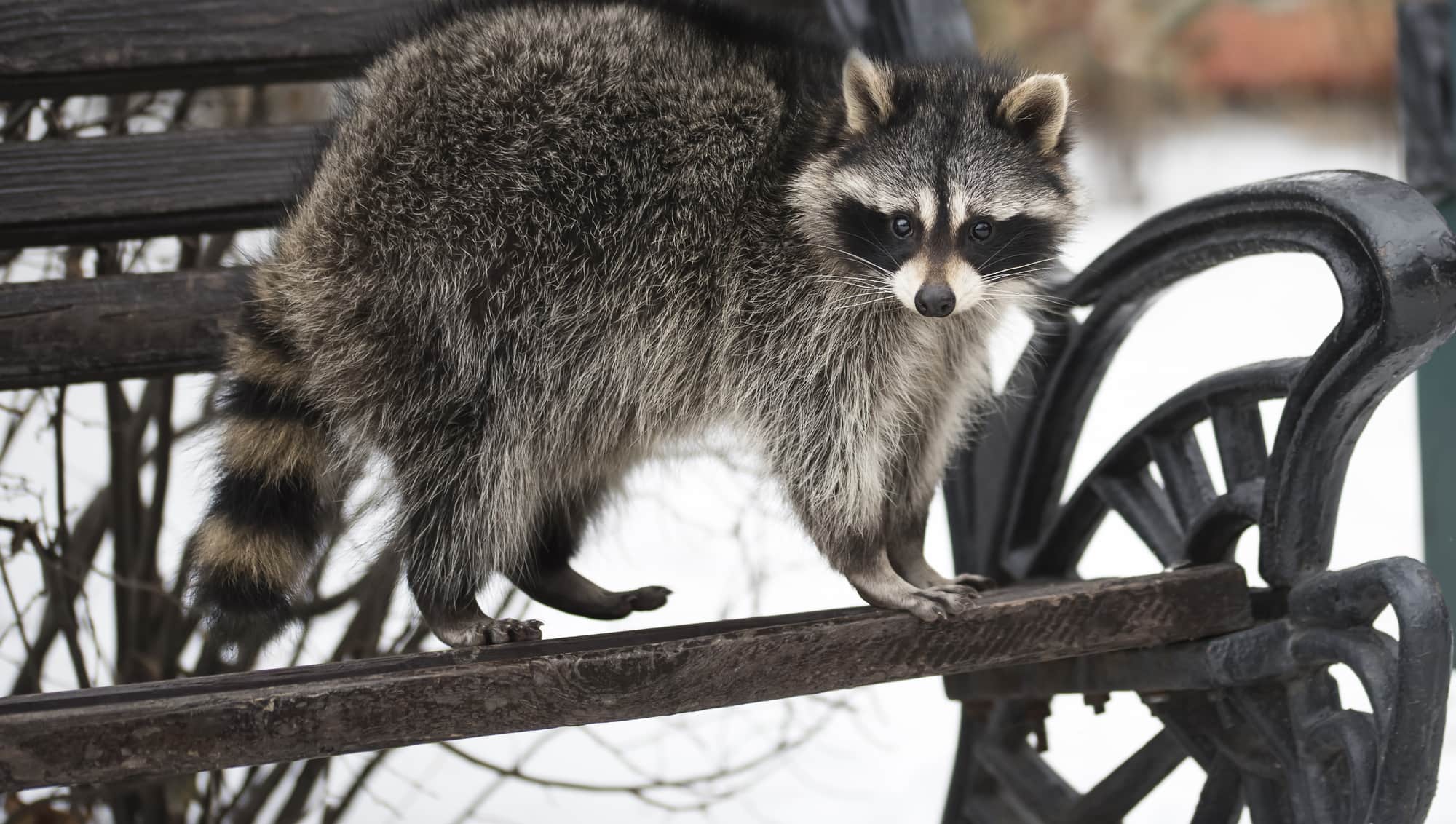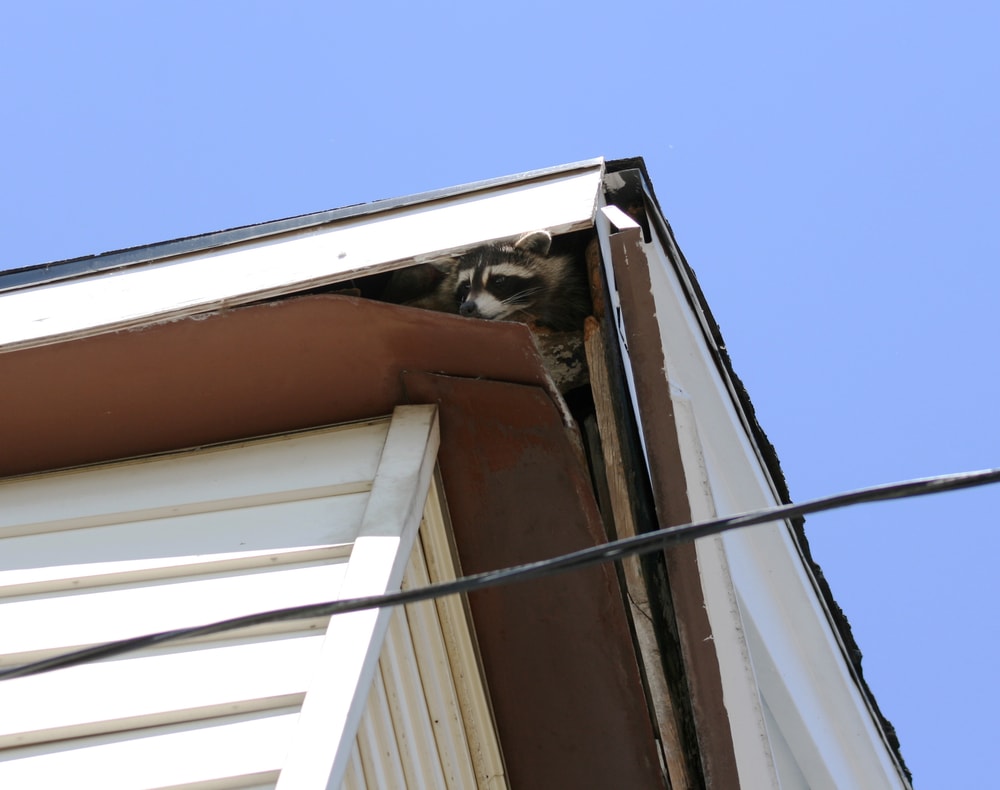What do raccoons do in the winter? More importantly, do you have to worry about them?

You may already know that the cold weather could drive rodents like mice, rats and squirrels into your home this season. But what about other mammals? Do you have to worry about raccoons in winter?
Unfortunately, it is possible. Take a look at the following information about raccoons so you can better understand why they might sneak into your attic or crawl space during colder months. Then find out what you can do if the problem arises.
What Do Raccoons Eat?
Raccoons are omnivores, meaning they eat other animals, insects and vegetation. However, their meal of choice is going to depend on where they live. For example, raccoons that live near the water may snag crawfish or frogs from streams and creeks. These mammals may also steal eggs from birds’ nests or sniff out insects or mice. And urban raccoons are definitely not above rummaging through your trash can or eating any pet food you might keep outside. To put it simply, raccoons will take whatever they can get.
Where Do Raccoons Live?
As these masked critters can make a meal out of anything, you can pretty much find them everywhere in the United States, with the exception of Alaska.
Regardless of the region of the U.S. where they reside, raccoons live in dens. They’re opportunistic when it comes to denning and can make a home out of fallen tree trunks, holes in trees or burrows that other animals have abandoned. They tend to prefer living near water, but it’s also not uncommon to find raccoons in attics or crawl spaces.
And it’s a good thing that raccoons aren’t too picky when it comes to housing, as they tend to switch dens every few days. Nursing females, however, may stay put until baby raccoons — called “kits” — are old enough to be moved. While raccoons do bounce from den to den, they still keep to a set territory. This is called a “home range,” and it usually spans anywhere from one to 18 miles.
Do I Have to Worry About Raccoons in Winter?
Raccoons are not true hibernators, meaning they do stay active year-round. That being said, you may see fewer raccoons in winter. This is because some raccoons, especially those in more northern states, may store up body fat in the spring and summer so they can spend most of the winter sleeping in their dens. In the winter months, they’ll sleep several weeks at a time, and it is possible to find several raccoons sharing a single den.

Since these masked mammals are less inclined to change dens when it’s cold out, it’s possible you may have a group — called a “gaze”— of raccoons in the attic in the winter.
How to Help Get Rid of Raccoons
According to the Centers for Disease Control and Prevention (CDC), these mammals are the most frequent carriers of rabies among wild animals. That means you definitely don’t want a gaze of raccoons in the attic this winter. Signs that raccoons have denned in or around your home include tracks or smudge marks on walls, decks or in soft ground near pipes and gutters. You may also see small piles of droppings near trees or on your roof.
If you do think you have raccoons in the attic, crawl space or anywhere around your home, you should call a wildlife removal service. Raccoons can be aggressive, especially if cornered, and their droppings can contain parasites that are dangerous to people, so you should never touch them. Because of these factors, leave it to a trained technician to help you figure out how to get rid of raccoons.
Can I Help Prevent Raccoons in Winter?
There are some steps you can take to make your home less attractive to raccoons in winter, though they may still find their way inside.
- Examine the exterior of your home to make sure there aren’t any openings through which raccoons could gain entry to your attic or crawl spaces. If there are, patch them up. Tip: Raccoons can fit through a hole about the size of softball.
- Rather than letting your summer or fall garden go to seed, clear it out and throw away any dead vegetation. Homeowners who compost may want to consider using a bin with a lid that can be sealed.
- Make sure your trash can lids are sealed tightly so that raccoons can’t use your garbage as a food source.
- If you keep chickens, house them in a coop in which they can be locked at night. Also, secure your coop with wire mesh rather than chicken wire, which raccoons can tear through.
- Don’t leave pet food or water outside at night. Raccoons are nocturnal and will happily munch on kibble if it’s available.
Although raccoons may be characterized as adorable bandits and ninjas in cartoons, they are wild animals that can carry pathogens that spread diseases. If you think you have raccoons in your attic or crawl spaces, contact a professional who can assess the situation and work with you to customize a removal and control plan.



